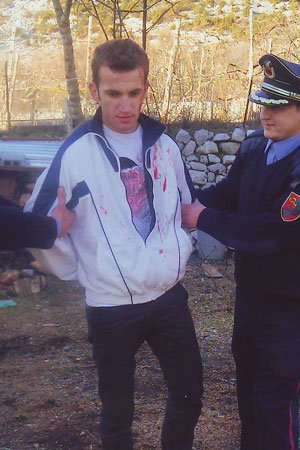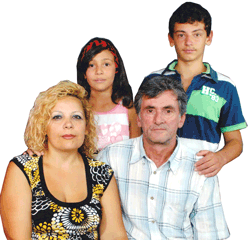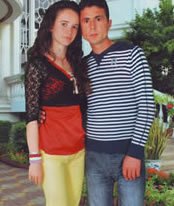It’s still violence on the political persecuted
Only a few days after the political persecuted suffered the violence of the state, a week ago the police used violence on the organizers in Shkoder and Malesi e Madhe.
We all know now that Berisha’s administration is mostly concerned about the anti-Berisha movement of the formerly political persecuted, now supported by the Democristian Party and some other parties. Some known analysts’ opinion is that even the Socialist Party is supporting this category on their efforts about indemnity the Democratic Party promised them since 1991.
Xhuliano Çekaj and his father, Kanto Çekaj, arrested by the police on February 5th, and held for a few hours at the police-station, declared for our journal saying: “We’re very tired of Berisha’s cheatings. He is the main obstacle to our legitimate requests. We’ve believed this man until now. We’ve been working for him and his party for many years. When my son, Bruno, risked his life for Berisha, it was I telling him to support that party, for that was going to help us. Me and my son are expelled from that party now and even arrested by the party we brought on power.”
“Let all the persecuted know that the DP is against us and our requests”, said Fred Rudaj, one of the main organizers of the formerly persecuted in Shkoder. Rudaj was arrested about five weeks ago. Neither Franc Vukaj, another organizer of the formerly persecuted, could escape arrest and physical violence, suffering moments of physical and psychological nightmares, along with Fred Rudaj.
“The police came at three in the morning to our house. They broke the door in and came with the guns. They searched all over our house, terrorized my family and arrested me and my father, Nikoll Vukaj. This is the greatest nightmare I’ve experienced in my life. They were brutal with me and my father at the police-station. The wounds on my face and all over my body can prove the violence we suffered. I’m telling you these things now, but I know I’m going to have other problems in the future, because I’m telling the truth”, Franc Vukaj says, with a trembling voice.
“Berisha and his party didn’t consider us for 20 years. He believes the persecuted are with him, because he is with the DP. This has changes since 2005, when Jozefina Topalli accused us and the DCP to be tools of the SP trying to destabilize the country. It’s them those who’re destabilizing the country using violence against us”, Spartak Pepaj said, he too was arrested by the police two days before the meeting which recorded so much violence and pressure. Berisha and Topalli’s spokesmen considered these meetings as anarchist, against the DP and organized by the left-winged tools of Edi Rama.
“We’ve taken special precautions against the organizers of these meetings in North Albania. We’ve prepared a list of the organizers and we’re contacting them one by one. The Regional Prosecution is preparing penal files against them and we’ll support the prosecution on charging these anarchist hooligans”, the police spokesman says.

Kanto Çekaj

Xhuliano Çekaj

Fred Rudaj
Statements and counter-statements, violence and terror; this is the complete view to be presented. “It is not the violence against the formerly persecuted and the DCP the solution to the problem. The DP and other State’s structures should consider seriously the persecuted. They are those who do not submit either to Berisha or to the police violence, until they get their rights. I pray that the State might not repeat the January 21st of 2011, when Berisha’s Special Guard was charged of the murder of the four peaceful protesters. I appeal to the organizations and the political parties, as well as to the members of the DP, to support the legitimate requests of the formerly persecuted and to stop the violence against them”, the spokesman of the DCP said.
“I’m greatly concerned about the violence against our members and organizers in North Albania. We’ve not only been set apart and persecuted for 50 years of communist dictatorship, but we’re also forced now to leave our country and go all over the world, in order to save our lives”, said during a phone-conversation from New York, our colleague, the well-known journalist Vasel Gilaj, who left Albania for the USA, the country of human freedom and democracy, after the problems he had in Albania as leader of the DCP and member of the former Politically Persecuted Association.
Sokol Pepushaj
The Kosovar family drama under revenge threat and without a country to live
The struggle for freedom and independence in Kosovo is already over since summer 1999 with as the NATO troops entered in; yet the drama of many Kosovar families moved away is still going on, even after all these years. The terror of murders and ethnic cleansing by the Milosevic regime is replaced by the threat of revenge on many innocent lives.
Like many other Kosovar families, the Sami Myftari’s family from Decan of Kosovo, had to move away from their birthplace in 1999. Sami took with him his wife Anila and his little son Gerald, while his mother Qamile and his brother Mithat stood in the bloody Kosovo. Just like many other families, this family was split because of the Kosovo crisis. Sami and his family came in Albania through great difficulties and with a broken heart. They stayed for three m onths in a refugee camp in Shkodra. To escape the fight and numerous problems, Sami and his family went in France on September 6th 1999. There they lived in Renne for four years, where their daughter Kjara was born. Though a Muslim family, Sami and his wife decided for an occidental name for their daughter, with the hope of having only good things in their lives. Sami and his family left France voluntarily in 2003. The only reason was to find his mother, who was left in Kosovo and for whose destiny they knew nothing. Arrives in Durres. On their bus drive back from Durres to Kosovo, along with other Kosovar families, Sami was having many plans for the future; but just during those hours their lives had a catastrophic turn. While talking to other Kosovar families in their bus, Sami knew his brother Mithat had killed Andro and Bozho Bela, their Serb neighbors. Mithat was killed too. Those traveling with Sami advised him not to go back to Kosovo, for the other two Serb brothers, Jovan and Bllazho, wanted him dead in revenge as well as to be “equal”, according to the Balkan revenge costume. Feeling threatened for his life and his family, Sami made his life’s hardest decision, to return to Shkodra. Sami was sheltered in the boarding school of the University of Shkodra. His wife Anila was hired as a cleaning lady and he as a guard. Every chance to go to Kosovo and meet his dearest person, his mother, was now impossible. His family was limited within the boarding school territory. When their children had the school age, their parents couldn’t go with them, but they were accompanied by a loving person who also was in danger because of any possible ambush of the Serb brothers seeking for revenge. As a guard, Sami was watching himself and his family too. As it was impossible for him to go back to Kosovo, the Court of Shkodra gave him the permission to have Albanian documents. Nevertheless, Sami feels Albania isn’t his natural country and he cannot live his whole life limited under the pressure of death in the name of revenge, and that was true for his family too. Danger increases every day more while movement between Albania and Kosovo is getting easier and easier, what could give the murderers the possibility to come to Shkodra and realize their plan to kill Sami and his family. onths in a refugee camp in Shkodra. To escape the fight and numerous problems, Sami and his family went in France on September 6th 1999. There they lived in Renne for four years, where their daughter Kjara was born. Though a Muslim family, Sami and his wife decided for an occidental name for their daughter, with the hope of having only good things in their lives. Sami and his family left France voluntarily in 2003. The only reason was to find his mother, who was left in Kosovo and for whose destiny they knew nothing. Arrives in Durres. On their bus drive back from Durres to Kosovo, along with other Kosovar families, Sami was having many plans for the future; but just during those hours their lives had a catastrophic turn. While talking to other Kosovar families in their bus, Sami knew his brother Mithat had killed Andro and Bozho Bela, their Serb neighbors. Mithat was killed too. Those traveling with Sami advised him not to go back to Kosovo, for the other two Serb brothers, Jovan and Bllazho, wanted him dead in revenge as well as to be “equal”, according to the Balkan revenge costume. Feeling threatened for his life and his family, Sami made his life’s hardest decision, to return to Shkodra. Sami was sheltered in the boarding school of the University of Shkodra. His wife Anila was hired as a cleaning lady and he as a guard. Every chance to go to Kosovo and meet his dearest person, his mother, was now impossible. His family was limited within the boarding school territory. When their children had the school age, their parents couldn’t go with them, but they were accompanied by a loving person who also was in danger because of any possible ambush of the Serb brothers seeking for revenge. As a guard, Sami was watching himself and his family too. As it was impossible for him to go back to Kosovo, the Court of Shkodra gave him the permission to have Albanian documents. Nevertheless, Sami feels Albania isn’t his natural country and he cannot live his whole life limited under the pressure of death in the name of revenge, and that was true for his family too. Danger increases every day more while movement between Albania and Kosovo is getting easier and easier, what could give the murderers the possibility to come to Shkodra and realize their plan to kill Sami and his family.
We’ve often heard about many departed families going back to Kosovo; but we’ve also heard about many open conflicts and victims between Kosovars and Serbs, as a consequence of the conflict in Kosovo. The Balkan revenge of an ethnic background is still as a sword upon the head of Sami and his family, as well as on many Kosovar families.
The Editorial Office
The British Chief-Prosecutor, Keir Starmer: January 21st, the personal and public attacks are worrying
While insisting on the independency of the constitutional institutions in Albania, the British Chief-Prosecu tor, Keir Starmer, was clearly concerned about the public and personal attacks against the independent institutions. tor, Keir Starmer, was clearly concerned about the public and personal attacks against the independent institutions.
He stated that attacks against an independent institution harm the democratic elements of the system of justice. This strong standing was stated during a press-conference in the presence of the UE Ambassador, Sequi and the British Embassy in Albania, in conclusion of his two day visit in our country.
“As the chairman of an independent institution, I’m concerned about the personal and public attacks over the integrity of the independent institutions and the individuals working in them. These attacks are harming not only for the targeted individuals, but also for the democratic elements of the system as well. If there’s some real concern or proves of violation, then these suppositions should follow the right channels, instead of giving void statements or using pressure on individuals”, Starmer said.
In his sight, the important issue on the January 21st happenings is a full investigation that brings justice. “I want to be clear, and it is important to have a full effective investigation that brings justice, and this investigation should be conducted independently by the Prosecution. I’d insist for this in my country”, he said.
Starmer was willing to collaborate with the Albanian General Prosecution Office on fighting crime. “The UK is engaged on working together with the Albanian law institutions to fight the crime which is threatening both countries, and strengthening the state of justice and the judicial system in Albania. Actually the departments and agencies of the United Kingdom, through our Embassy in Tirana, are working with many authorities in the law field, with assistance projects, studies, twinning projects and so on. Our work with the General Prosecutor and its office is a central pillar of this cooperation”, he emphasized. The integrity and independency of the justice institutions, according to him, is indispensable, underlining that the Prosecution institution should be free to do justice.
The German Ambassador Holtkemper: FBI conclusions on January 21st are not a matter of taste
The German Ambassador in Tirana, Carola Muller-Holtkemper said that the international community is concerned about the delay on the investigations of January 21st. In an interview for DW, she said that the FBI expertize is of “absolute value” and there couldn’t be great differences from their conclusions for, according to her, it is not a matter of  taste but of physic laws. taste but of physic laws.
“As far as the death causes is concerned, there is now a voluminous expertize of the FBI and we can only hope that further steps will be taken on this solid foundation. The FBI had its conclusions based on known physics laws. If these experts got certain conclusions based on physics laws of absolute value, as it is the gravity or the electrical lines frequency wavering, than I don’t believe there will be great differences in this sense – it is not a matter of taste in this case, Mrs. Holtkemper said.
But the blue seat is still accusing the Chief Prosecutor Ina Rama and the leader of the SP of cheating the large opinion and cooperation between them, in order to cover, according to the DP, what they call the “screenplay of January 21st”. The opposition leader, Edi Rama, on the other side, says the investigation evidence is nailing: “the MC continued today insulting the Prosecutor, what is a shame for Albania! The investigation evidence is nailing, while insults prove why a change is needed”, was stated on Twitter. The right-wing parliamentary, Fatbardh Kadilli, accused the Chief Prosecutor Ina Rama of speculation on the expertize coming from the FBI.
Love in “time of cholera” named blood feud vengeance
In the Albanian reality may happen that the most sublime human feeling, named love, to become a endless suffering Calvary. As a “cholera” of modern times, blood feud vengeance has extended its “clutches” even in the relations between the Albanian youth. Two years ago, Aleksander Rezaj , from the village Sukaj-Dajc of the commune Dajc, Shkodra district, recognized and then falls in love with Elizabete Velaj, from the village Sterbeq, Municipality of Koplik in the district of Malesia Madhe. At that time, the girl was only 17 - years old, and the boy was 34 years old. Love knows no age difference, but the girl’s family did not think so. Once the bond of love between Aleksander and Elizabete have been discovered from the girl’s relatives , Elizabete have been isolated against her with and she was not allowed to meet with Alexander. According to the Canon, it was “humiliated” her family with this sincere and pure love relationship. The only way of communication, also very limited, was the mobile. In the very rare case , when the girl was able to communicate with Aleksander, she reaffirms its determination to keep this relationship. Considering impossible the normally crowned of their relationship , Elizabete says to Aleksander to be ready to leave her home at any cost, to be united with the love of her life. Through the handse t, they appoint a night, 21 December 2010 where Elizabete Velaj escaped the house and Aleksander was waiting at her house with his car. Aleksander takes the girl and leads her immediately to his home in Sukaj-Dajc. For the mentality of the area, but also the force that has the Canon in Malesia Madhe, the entire village of Sterbeq expressed it’s indignation and surprise for this action. Under the influence of the opinion of the village, but also with the weight of the Canon on the shoulders, the girl’s family sends word to her and Aleksander that, they will be killed because they can not bear the weight of humiliation. Since 21 December 2010, Aleksander Rezaj and Elizabete Velaj joined in all the meanings as husband and wife, promising each other that they will never be divided as to divide by death. But from that day, Elizabete and Aleksander live in isolation, because each of their output outside the home, seriously risks their lifes in the name of the Canob, but also to “satisfy” the opinion of the village Sterbeq of Koplik. The wish of the young couple, is to crown their relationship legally in the Civil Status Offices, but they, have not yet found the opportunity to celebrate this relationship becouse of the fear of being assassinated in the ambush. There are few cases in Northern Albania, which has been killings of this nature. “Humiliation “ of the girls who leaves the house with the future husband, is not tolerated and immediately classified a notorious chapter of the Canon. In the case of two young people, the risk is even higher after the village Sterbeq opinion “and welcomes” this murder. t, they appoint a night, 21 December 2010 where Elizabete Velaj escaped the house and Aleksander was waiting at her house with his car. Aleksander takes the girl and leads her immediately to his home in Sukaj-Dajc. For the mentality of the area, but also the force that has the Canon in Malesia Madhe, the entire village of Sterbeq expressed it’s indignation and surprise for this action. Under the influence of the opinion of the village, but also with the weight of the Canon on the shoulders, the girl’s family sends word to her and Aleksander that, they will be killed because they can not bear the weight of humiliation. Since 21 December 2010, Aleksander Rezaj and Elizabete Velaj joined in all the meanings as husband and wife, promising each other that they will never be divided as to divide by death. But from that day, Elizabete and Aleksander live in isolation, because each of their output outside the home, seriously risks their lifes in the name of the Canob, but also to “satisfy” the opinion of the village Sterbeq of Koplik. The wish of the young couple, is to crown their relationship legally in the Civil Status Offices, but they, have not yet found the opportunity to celebrate this relationship becouse of the fear of being assassinated in the ambush. There are few cases in Northern Albania, which has been killings of this nature. “Humiliation “ of the girls who leaves the house with the future husband, is not tolerated and immediately classified a notorious chapter of the Canon. In the case of two young people, the risk is even higher after the village Sterbeq opinion “and welcomes” this murder.
Albert Vataj
|

